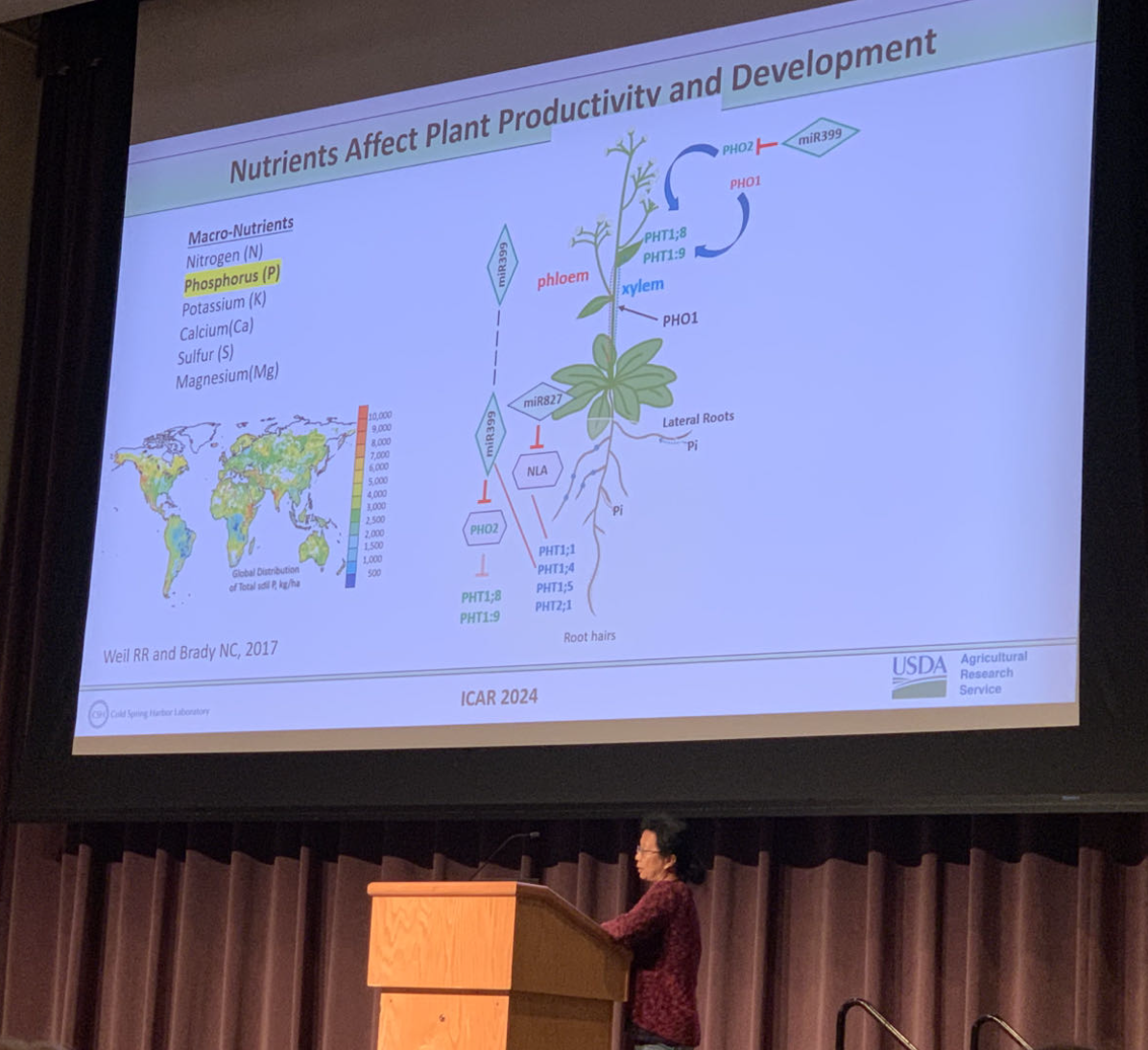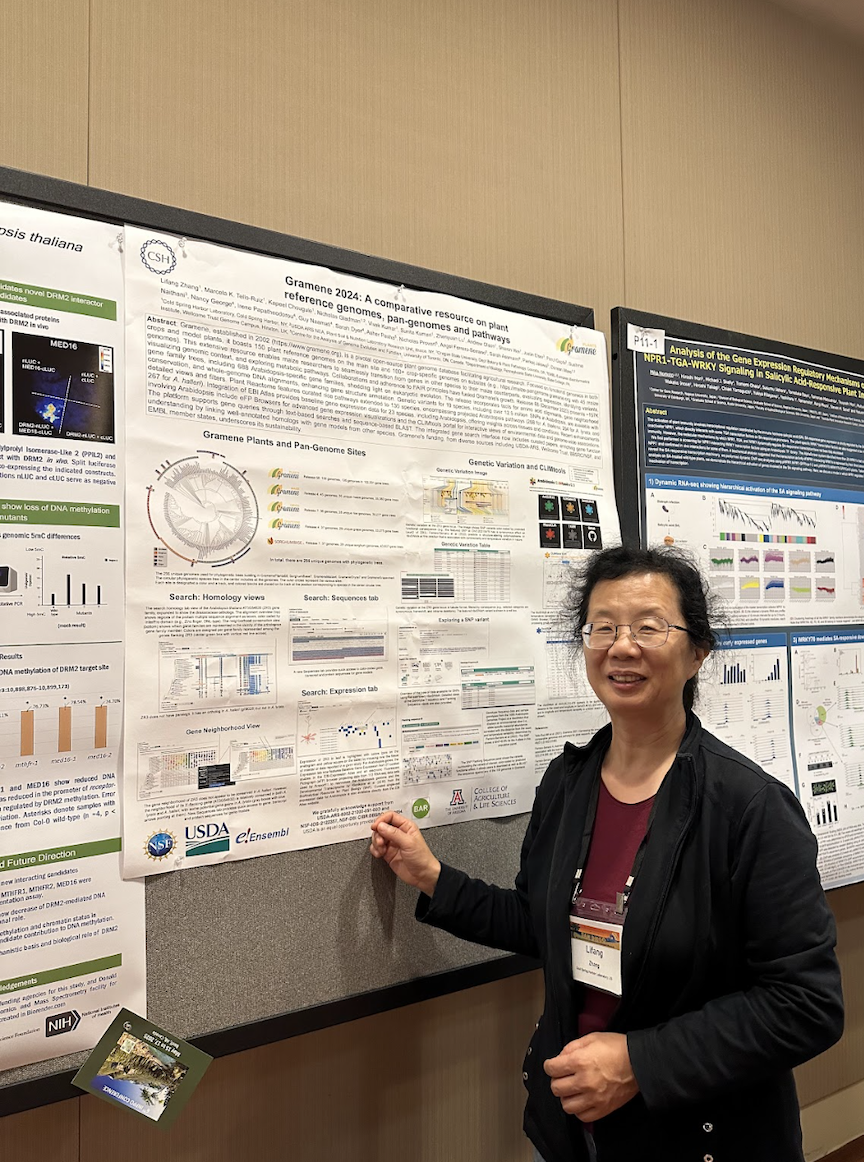ICAR 2024: Pioneering Advances and Collaborative Insights in Arabidopsis Research
The International Conference on Arabidopsis Research (ICAR) 2024 was held in San Diego, California, from July 15-19, 2024. Organized by the North American Arabidopsis Steering Committee (NAASC), the focus of the meeting was on “discovery, innovation, application, and impact” in Arabidopsis research. This conference brought together over 500 participants, with over 40% attending for the first time. There were more than 270 posters and over 200 talks, including many concurrent sessions. Many sessions were organized by young scientists and postdocs, which is characteristic of the ICAR meeting. Throughout the conference scientists were encouraged to adopt PMEX (Plant Methods Exchange Platform), a website for researchers to exchange and optimize experimental protocols.
Dr. Lifang Zhang presented a lightning talk titled, “Characterization of Key Regulators in MicroRNA-Mediated Responses to Phosphate Deficiency in Arabidopsis Root Development.” She described a miRNA gene regulatory network, integrated it with Pi-responsive transcriptome profiles, and identified a sub-network. From this sub-network, 20 transcription factor mutants were selected for testing root phenotype and three previously uncharacterized TFs were identified that significantly impact root length under phosphate-limiting conditions.
Dr. Zhang also presented a poster on the Gramene database titled, “Gramene 2024: A Comparative Resource on Plant Reference Genomes, Pan-Genomes, and Pathways.”
A tribute was paid to the late Philip Benfey, a biology professor at Duke University. His former students, postdocs, current staff and scientific peers discussed his contribution to science, especially to root development. They shared that he dropped out of college and spent six years traveling around the world before returning to college and subsequently attending graduate school, and that he ventured into entrepreneurship and helped set up several startup companies. It was a fitting salute to a highly revered scientist.
Joane Chory, a professor and director of the Plant Molecular and Cellular Biology Laboratory at the Salk Institute for Biological Studies, as well as a Howard Hughes Medical Institute investigator, received a Lifetime Achievement Award. Over her 30 years of work she is most renowned for employing molecular genetics to explore how plants alter their shape and size to enhance photosynthesis and growth in diverse environments.
An engaging seminar was given by Holger Puchta Karlsuche, director of the Botanical institute at the Karlsruhe Institute of Technology (KIT) in Denmark. The talk “Directed restructuring of the Arabidopsis genome by Crispr/Cas-mediated chromosome engineering,” outlined an application of “CRISPR” technology that allows for moving large sections of a chromosome to different locations. Another fascinating talk was presented by Patricia Lang, an assistant professor from UC Berkeley; she is checking stomata density in samples from a museum collection. This may evolve into a long term project, collecting samples from different areas in order to create a 3D data geo-pheno timeline (phenotype over the timeline from different geographical positions).
With a blend of innovative talks, engaging sessions, and collaborative opportunities, ICAR fostered a spirit of discovery and advancement. The event underscored the importance of both seasoned and emerging scientists in driving the field forward and the adoption of new platforms like PMEX exemplifies the community’s commitment to collaborative progress. As attendees return to their respective institutions, the knowledge and connections gained at ICAR 2024 will undoubtedly fuel future breakthroughs in Arabidopsis research, continuing to push the boundaries of plant science.

Dr. Lifang Zhang, a senior scientist at CSHL, presents her lightning talk, “Characterization of Key Regulators in MicroRNA-Mediated Responses to Phosphate Deficiency in Arabidopsis Root Development.”

Dr. Zhang standing at her poster about Gramene.
- aolson's blog
- Log in to post comments
